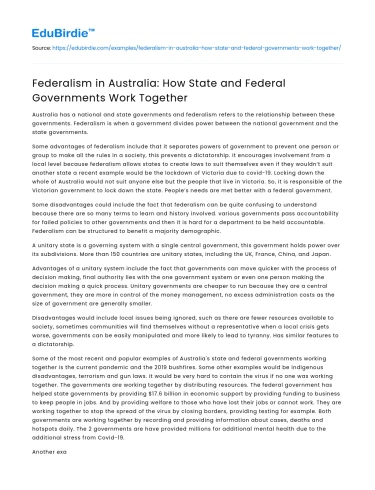Australia has a national and state governments and federalism refers to the relationship between these governments. Federalism is when a government divides power between the national government and the state governments.
Some advantages of federalism include that it separates powers of government to prevent one person or group to make all the rules in a society, this prevents a dictatorship. It encourages involvement from a local level because federalism allows states to create laws to suit themselves even if they wouldn’t suit another state a recent example would be the lockdown of Victoria due to covid-19. Locking down the whole of Australia would not suit anyone else but the people that live in Victoria. So, it is responsible of the Victorian government to lock down the state. People’s needs are met better with a federal government.
Some disadvantages could include the fact that federalism can be quite confusing to understand because there are so many terms to learn and history involved. various governments pass accountability for failed policies to other governments and then it is hard for a department to be held accountable. Federalism can be structured to benefit a majority demographic.
A unitary state is a governing system with a single central government, this government holds power over its subdivisions. More than 150 countries are unitary states, including the UK, France, China, and Japan.
Advantages of a unitary system include the fact that governments can move quicker with the process of decision making, final authority lies with the one government system or even one person making the decision making a quick process. Unitary governments are cheaper to run because they are a central government, they are more in control of the money management, no excess administration costs as the size of government are generally smaller.
Disadvantages would include local issues being ignored, such as there are fewer resources available to society, sometimes communities will find themselves without a representative when a local crisis gets worse, governments can be easily manipulated and more likely to lead to tyranny. Has similar features to a dictatorship.
Some of the most recent and popular examples of Australia's state and federal governments working together is the current pandemic and the 2019 bushfires. Some other examples would be indigenous disadvantages, terrorism and gun laws. It would be very hard to contain the virus if no one was working together. The governments are working together by distributing resources. The federal government has helped state governments by providing $17.6 billion in economic support by providing funding to business to keep people in jobs. And by providing welfare to those who have lost their jobs or cannot work. They are working together to stop the spread of the virus by closing borders, providing testing for example. Both governments are working together by recording and providing information about cases, deaths and hotspots daily. The 2 governments are have provided millions for additional mental health due to the additional stress from Covid-19.
Another example would be the 2019 bushfires, again the governments worked together by providing resources, funding and accommodation for people affected. The federal government provided states with the army to help. States worked together by providing water and firefighters and other resources. Provided a $2 billion bushfire recovery fund to help rebuild communities.






 Stuck on your essay?
Stuck on your essay?

